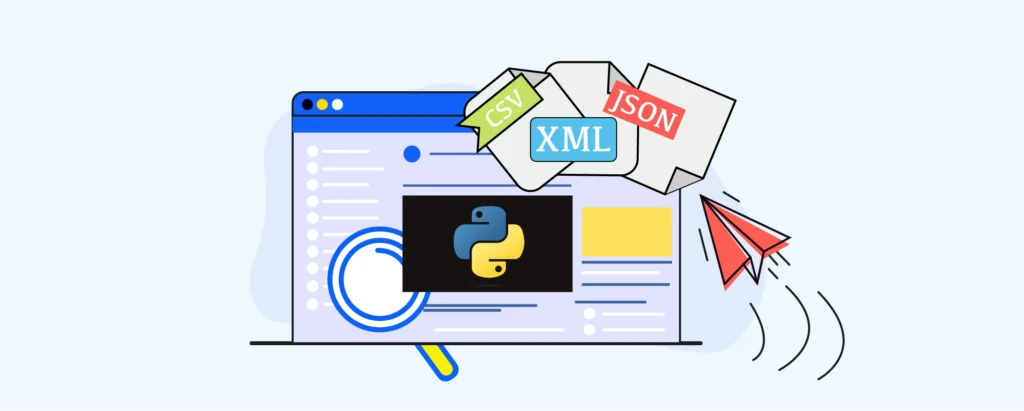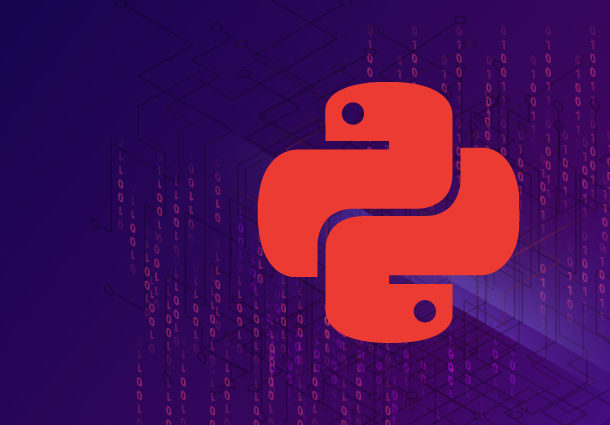Python for Web Scraping: Bridging the Gap from Raw Data to Actionable Insights
With its unmatched web scraping skills, Python becomes a dominant force in the complex world of data collecting. Effectively obtaining data from online sources is crucial because businesses depend more and more on data-driven insights to guide decisions and provide them a competitive edge. One approach to access a wealth of important data is through web scraping, which is the automated process of collecting information from websites. Python for webscraping is the versatile and powerful programming language at the center of this approach, known for its ease of use, readability, and broad library support.
Python’s popularity in web scraping stems from the large number of libraries and tools that are specifically designed for this use case. With tools like Beautiful Soup, Scrapy, Selenium, and Requests, developers can easily navigate and extract data from websites of any complexity using Python. It is the best option for creating complex web scraping programs that can easily handle dynamic material, travel through numerous sites, and extract structured data because to its simple syntax and extensive capabilities.
With tools like Beautiful Soup, Scrapy, Selenium, and Requests, developers can easily navigate and extract data from websites of any complexity using Python. It is the best option for creating complex web scraping programs that can easily handle dynamic material, travel through numerous sites, and extract structured data because to its simple syntax and extensive capabilities.
Furthermore, Python’s scalability and flexibility make it an excellent choice for addressing the various difficulties that arise during web scraping projects. Python offers the freedom to tailor scraping solutions in accordance with particular requirements and objectives, whether the data is being scraped for lead creation, competitor analysis, or market research. Organizations can turn unprocessed online data into meaningful insights that inform strategic decision-making and spur company expansion by utilizing Python’s extensive capabilities. To put it simply, Python is a powerful ally on the path from raw data bytes to priceless insights that influence enterprises worldwide.
Python’s Sovereignty: Empowering Data Extraction with Robust Versatility and Superior Tools
The Python ecosystem has several robust libraries made expressly for online scraping, such as BeautifulSoup, Scrapy, Requests, and Selenium. These libraries give developers a wide range of tools and features so they can easily manage complex HTML structures, explore online sites, and extract data. Python’s libraries provide the adaptability and dependability required to handle a broad range of scraping tasks with ease, whether scraping static or dynamic content.
Beyond its specific scraping libraries, Python’s flexibility includes its fundamental language characteristics and a large number of third-party modules. Python’s dynamic typing and user-friendly syntax allow developers to easily prototype and implement custom scraping routines. Python is the recommended option for data extraction activities across industries because of its versatility in operating systems and platforms, which guarantees a smooth integration into current workflows.
Python’s reliability, scalability, and performance further demonstrate its superiority over other web scraping solutions. Python provides a wide choice of tools to meet every scraping need, from lightweight libraries for straightforward scraping tasks to extensive frameworks for intricate web crawling operations. Moreover, the dynamic Python development community consistently makes contributions to the refinement and expansion of current tools, guaranteeing that developers have access to the most recent developments in web scraping technology.
Python provides a wide choice of tools to meet every scraping need, from lightweight libraries for straightforward scraping tasks to extensive frameworks for intricate web crawling operations. Moreover, the dynamic Python development community consistently makes contributions to the refinement and expansion of current tools, guaranteeing that developers have access to the most recent developments in web scraping technology.
Because of its superior tooling, dependability, and versatility, Python has become the industry standard for web scraping. Python continues to be the preferred tool for gathering important data from the web as businesses depend more and more on data-driven insights to guide decisions and provide them a competitive edge. By enabling developers to fully utilize web scraping using Python extensive ecosystem of modules and tools opens the door for groundbreaking discoveries and insights.
Dominating Web Scraping with Versatile Libraries and Advantages of Python
Web scraping with Python is a powerful tool for intricate operations due to its versatility. Its easy-to-understand syntax, dynamic typing, and broad library support give developers the freedom to easily handle a variety of data formats, extract data, and explore web sites. When it comes to scraping static HTML text or dealing with dynamic JavaScript-driven features, Python is the go-to option for developers looking to glean insightful information from the broad web because of its robust capabilities.
The bundance of libraries designed especially for web scraping using python jobs serves as more evidence of the language’s dominance in this field. Python web scraping Libraries with strong features, flexibility, and ease of use, such as BeautifulSoup and Scrapy, have received high praise. While Scrapy offers a thorough framework for creating scalable and maintainable online scraping projects, BeautifulSoup excels at parsing HTML and XML documents. By streamlining the scraping process, these tools free up developers to concentrate on obtaining useful data instead of being bogged down by the intricate details of traversing web pages and extracting data.
While Scrapy offers a thorough framework for creating scalable and maintainable online scraping projects, BeautifulSoup excels at parsing HTML and XML documents. By streamlining the scraping process, these tools free up developers to concentrate on obtaining useful data instead of being bogged down by the intricate details of traversing web pages and extracting data.
The advantages of using Python web scraping for business insights are manifold. Python’s popularity and community support ensure access to a wealth of resources, tutorials, and documentation, making it easy for developers to get started with web scraping projects. Moreover, Python’s cross-platform compatibility enables scraping tasks to be performed on various operating systems, enhancing accessibility and scalability. Additionally, Python’s seamless integration with other data processing and analysis tools, such as Pandas and NumPy, facilitates the seamless transition from data extraction to analysis and visualization.
Python’s unparalleled capabilities, versatile libraries, and myriad advantages solidify its position as the ultimate tool for web scraping, empowering developers to extract valuable insights and unlock the full potential of data-driven decision-making.
Python’s Web Scraping Odyssey: Overcoming Challenges with Ingenious Solutions
When using Python for web scraping, developers face a variety of obstacles that call for creative solutions in order to overcome. Python offers an abundance of ways to get over anti-scraping techniques, handle intricate data parsing jobs, and scale scraping activities effectively. These solutions help achieve dependable data extraction.
A lot of websites use anti-scraping techniques to prevent automated data extraction, like rate restriction, IP blocking, and CAPTCHA challenges. Python programmers use a variety of strategies to get around these controls, such as changing user agents, using proxy servers, and putting in place CAPTCHA-solving services. Furthermore, Python’s asynchronous programming features let programmers carry out scraping activities without causing a block, which lowers the risk of discovery and lessens the effect of anti-scraping policies.
Web pages often contain complex HTML structures and inconsistent data formats, posing challenges for data parsing in Python scraping scripts. To address this, developers leverage Python libraries like BeautifulSoup and lxml, which offer robust HTML parsing capabilities and flexible data extraction methods. Advanced techniques such as regular expressions and XPath queries enable precise extraction of desired data elements, even from heavily nested or unstructured HTML documents.
Scalability and efficiency are critical considerations in large-scale web scraping using python projects. Python provides solutions for scaling scraping operations efficiently, such as asynchronous scraping with libraries like aiohttp and asyncio, which enable concurrent data retrieval and processing. Additionally, Python’s multiprocessing and distributed computing capabilities allow developers to parallelize scraping tasks across multiple CPU cores or distributed computing clusters, further enhancing performance and scalability.
Sailing Through Web Scraping Waters: Confronting Challenges with Best Practices and Strategies
Developers face numerous obstacles when they start web scraping, which can make it difficult to collect data from websites efficiently. But with the right techniques and procedures, these difficulties can be overcome and ethical and successful scraping operations can be achieved.
Webscraping projects frequently have difficulties navigating intricate HTML structures, processing dynamic content, and coping with anti-scraping mechanisms put in place by websites. JavaScript-generated dynamic content needs extra care because it may be difficult for standard scraping techniques to extract dynamically loaded data. Furthermore, websites may use anti-scraping strategies to discourage automated scraping, such as IP blocking, CAPTCHA challenges, and rate restriction.
Developers need to follow best practices in order to get beyond these obstacles and carry out web scraping activities in an ethical manner. This entails observing robots.txt directives, which provide guidelines for web crawlers, and configuring the proper user-agent headers to detect automated data mining programs. Moreover, putting in place rate limits and error-handling procedures can stop excessive requests and guarantee that target websites are not overloaded by scraping activity. Developers should also handle data that has been scraped ethically and securely, giving data privacy and security top priority.
To address challenges related to dynamic content and anti-scraping measures, developers can employ various strategies. Utilizing headless browsers like Selenium allows for dynamic content rendering and interaction, enabling the scraping of JavaScript-driven websites. Implementing IP rotation and proxy servers can help bypass IP blocking and prevent detection by anti-scraping measures. Moreover, employing machine learning techniques for CAPTCHA solving or utilizing CAPTCHA-solving services can automate the resolution of CAPTCHA challenges encountered during scraping.
Successful web scraping with python requires a combination of technical expertise, ethical considerations, and strategic approaches. By understanding and addressing common challenges, adhering to best practices, and employing effective strategies, developers can navigate the complexities of web scraping with confidence and achieve their data extraction goals while maintaining ethical standards. With careful planning and execution, web scraping projects can yield valuable insights and drive informed decision-making for businesses across industries.
Python’s Prowess and Pattem Digital’s Promise: Shaping the Future of Web Scraping
To sum up, there is no denying Python’s superiority in web scraping due to its unparalleled data extraction capabilities. Python’s importance in this sector has been underscored by this discussion, which has brought to light important discoveries and applications. In the future, Pattem Digital, as a python web development company will lead the way in providing innovative solutions for web scraping, and Python is expected to be the driving force behind this innovation. We are the perfect partner for maximizing Python’s potential in web scraping projects, guaranteeing success, and maintaining an advantage in the rapidly changing digital landscape because of our dedication to quality and innovation.





